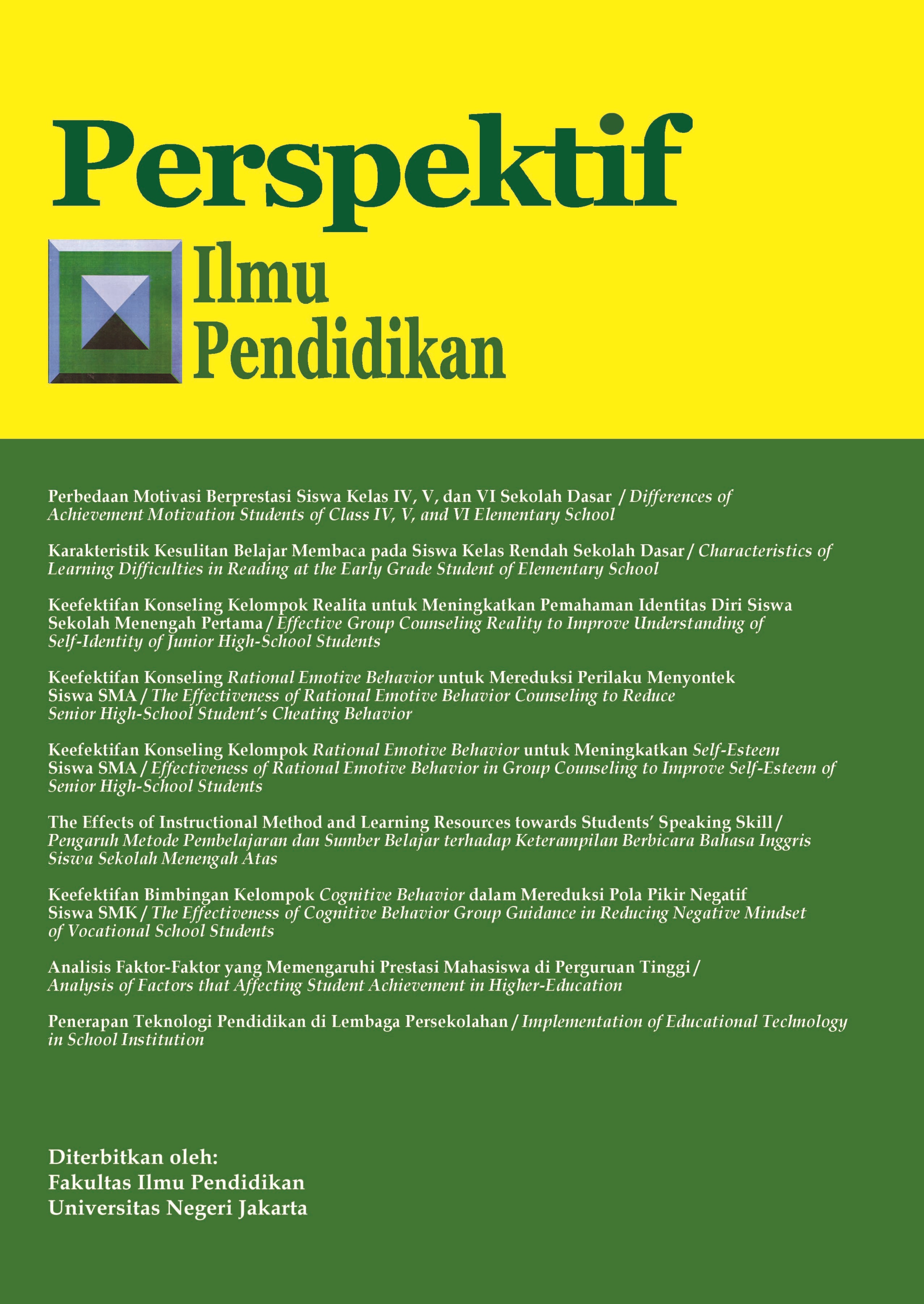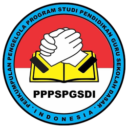KEEFEKTIFAN KONSELING KELOMPOK REALITA UNTUK MENINGKATKAN PEMAHAMAN IDENTITAS DIRI SISWA SEKOLAH MENENGAH PERTAMA
Abstract
This study aims to test the effectiveness of reality counseling to improve students' self-identity in junior high. This research uses pre experimental with pretest-posttest one group design. The data analysis used is paired test of T-test. To see the change of self-understanding level in the experimental group between pretest and posttest by looking at the price of ttable on the degrees of freedom (dk), ie the amount is N-1, and at a significant level α = 0.05 (95%) then obtained ttable = 1.771, assuming if thitung > ttabel then Ha "received" the meaning of group reality counseling is effective to improve understanding of the identity of junior high-school students. The research was carried out starting from April to July 2018, which took place at SMP Negeri 2 Mojosari. Based on the findings of the study, it is suggested as follows (1) for Guidance and Counseling teachers, group counseling can be applied effectively in schools, especially in improving understanding of students' self-identities; (2) for researchers, furthermore, group reality counseling is effective in improving self-understanding students, should be able to be an inspiration in doing further research by applying group counseling with other techniques, especially in an effort to improve students' self-identity understanding.
References
Andreouli, E. (2010). Identity, positioning and self-other relations. Papers on Social Representations, 19(1), 14-1.
Azwar, A., & Prihartono, J. (2003). Metodologi penelitian kedokteran dan kesehatan masyarakat. Batam: Binarupa Akara.
Brooks, M., & Knowles, D. (1982). Parents' views of children's imaginary companions. Child Welfare, 61(1). 25-33.
Corey, G. (2009). Theory and practice of counseling and psychotherapy. Belmont, CA: Brooks.
Depdiknas. (2010). Buku pedoman sertifikasi pendidik untuk dosen tahun 2010: Buku I naskah akademik. Direktorat Jenderal Pendidikan Tinggi.
Gunarsa, S. D. (2005). Psikologi perkembangan anak dan remaja. Jakarta: Gunung Mulia.
Habsy, B. A. (2017a). Model konseling kelompok cognitive behavior untuk meningkatkan self esteem siswa SMK. Perspektif Ilmu Pendidikan, 31(1), 21-35. doi: https://doi.org/10.21009/PIP.311.4
Habsy, B. A. (2017b). Filosofi ilmu bimbingan dan konseling Indonesia. Jurnal Pendidikan (Teori dan Praktik), 2(1), 1-11. doi: http://dx.doi.org/10.26740/jp.v2n1.p1-11
Habsy, B. A. (2018a). Konseling rasional emotif perilaku: Sebuah tinjauan filosofis. Indonesian Journal of Educational Counseling, 2(1), 13-30. doi:https://doi.org/10.30653/001.201821.25
Habsy, B. A. (2018b). Model bimbingan kelompok PPPM untuk mengembangkan pikiran rasional korban bullying siswa SMK Etnis Jawa. Jurnal Pendidikan (Teori dan Praktik), 2(2), 91-99. doi:http://dx.doi.org/10.26740/jp.v2n2.p91-99
Hurlock, E. B. (2001). Developmental psychology. New York: Tata McGraw-Hill Education.
Heriyadi, A. (2013). Meningkatkan penerimaan diri (self acceptance) siswa kelas VIII melalui konseling realita di SMP Negeri 1 Bantarbolang Kabupaten Pemalang tahun ajaran 2012/2013. Disertasi. Semarang: Universitas Negeri Semarang.
Latipun. (2008). Psikologi konseling. Malang: UPT Penerbitan Universitas Muhammadiyah Malang.
Masrohan, A. (2014). Penerapan konseling kelompok realita teknik WDEP untuk meningkatkan disiplin belajar siswa kelas XI IPS SMA Negeri 1 Rogojampi Banyuwangi. Jurnal BK UNESA, 4(3). 1-10. http://jurnalmahasiswa.unesa.ac.id/index.php/jurnal-bk-unesa/article/view/9046
Nurihsan, A. J. (2005). Strategi layanan bimbingan dan konseling. Bandung: Refika Aditama.
Papalia, D. E., Olds, S.W., & Feldman, R.D. (2008). Psikologi perkembangan. Jakarta: Kencana.
Purwanti, F. (2013). Identitas diri remaja pada siswa kelas XI SMA Negeri 2 Pemalang ditinjau dari jenis kelamin. Skripsi. Semarang: Universitas Negeri Semarang.
Ristianti, A. (2012). Hubungan antara dukungan sosial teman sebaya dengan identitas diri pada remaja di
SMA Pusaka 1 Jakarta. Skripsi. Jakarta: Universitas Gunadarma.
Sarwono, S. W. (2011). Psikologi remaja. Depok: PT. Rajagrafindo Persada.
Sugiyono, P. (2010). Metode penelitian kuantitatif, kualitatif, dan R&D. Bandung: CV Alfabeta.
Wells, G. B., & Hansen, N. D. (2003). Lesbian shame: Its relationship to identity integration and attachment. Journal of Homosexuality, 45(1), 93-110. doi: http://psycnet.apa.org/doi/10.1300/J082v45n01_05
Yusuf LN, Syamsu. (2004). Psikologi perkembangan anak & remaja. Bandung: PT Remaja Rosdakarya.
Authors who publish with this Journal agree to the following terms:
- Author retain copyright and grant the journal right of first publication with the work simultaneously licensed under a creative commons attribution licensethat allow others to share the work within an acknowledgement of the work’s authorship and initial publication of this journal.
- Authors are able to enter into separate, additional contractual arrangementfor the non-exclusive distribution of the journal’s published version of the work (e.g. acknowledgement of its initial publication in this journal).
- Authors are permitted and encouraged to post their work online(e.g. in institutional repositories or on their websites) prior to and during the submission process, as it can lead to productive exchanges, as well as earlier and greater citation of published works.
-
Users/public use of this website will be licensed to CC BY-NC-SA Creative Commons Attribution-NonCommercial-ShareAlike 4.0 International License








